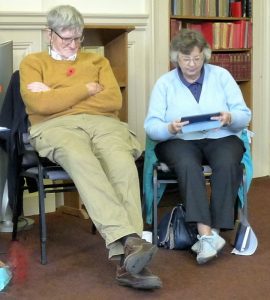The Plymouth Literature Festival runs until 2nd November – an exciting 12 days, with the aim of promoting local authors. One of the events I ran was called Memories are made of this.
During the session I gave some tips on writing memoir, interspersed with readings from the Plymouth Christian Writers’ Group, who had polished up some memories of their own for the occasion.
Here are some of my
TIPS FOR WRITING MEMOIR
How to tackle those memories
 ‘Write memoir, not autobiography. An autobiography is the story of an entire life, but a memoir is just one story from that life. You can only ever write one autobiography, but you can write countless memoirs. It’s a much less intimidating project if you view it that way.’
‘Write memoir, not autobiography. An autobiography is the story of an entire life, but a memoir is just one story from that life. You can only ever write one autobiography, but you can write countless memoirs. It’s a much less intimidating project if you view it that way.’
From How to write your memoir, by Joe Kita
How to start
It’s a good idea to keep a notebook. Jot things down as you remember them. It’s good to have sections, for example: before I went to school; my primary school days; teenage years; at work; etc.. You may find that at first you only remember a few things, but after a while, more and more memories will come flooding back.
Before you start writing for your family
Think about your reader. Think about yourself as a reader. Why do you carry on reading a story or a book? Because it’s interesting. So…
Find a good starting point. A cracking first line.
What writers call a hook. Something that lifts your piece of writing out of the ordinary.
How to make your memoir more interesting
Use the five senses – help everyone relate to your story.
Here’s a fictitious example.
Don’t just write: ‘It was 5th November, and we were taken to the village bonfire by our Dad. There was a great crowd of people.’
Tell us about some details. The distant flicker of flames. The smoke that tickled your nose. We want to imagine the guy lolling on top of the giant bonfire. The first rocket that swooshed into the sky. Describe your reactions. Did you clutch Dad’s hand, or did you jump up and down and clap your hands?
 Good writing triggers a response from the reader
Good writing triggers a response from the reader
You want your family to understand what it was like, when you were a child, when you went to school, how bossy those grown-ups were.
Sometimes you have to capture a special moment, and leave it at that. Don’t ramble on.
Sometimes it helps to turn an incident in your past into a memorable funny story.
Points of departure
Think about things you struggled with, things you achieved, things that puzzled you.
One day your memoir is going to make fascinating reading for future generations. The time to start writing is now.
FROG: (Nostalgically)
The sunlight shining down through the water in the pond….
Sounds romantic? Well, it was until that huge toad landed ON MY HEAD!!

